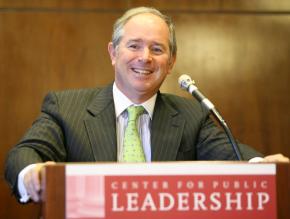Why do we need the rich?
explains how Marxists answer the common objection to taxing the rich.
THE RICH put their hard-earned wealth to use for the rest of us by making investments and creating jobs--this is perhaps the most common defense raised by conservatives against the idea of taxing the wealthy, let alone the socialist case that workers should run society themselves, without capitalists.
But is it "their" money in the first place? And do we really need the rich for the economy to operate?
Before answering these questions--in the negative, on both counts--I think it's important to understand what we mean by "rich."
Earlier this year, hapless Republican National Committee Chair Michael Steele had the nerve to say that a million dollar salary isn't a lot of money. After taxes, of course, these folks will only be taking home $600,000 and some change each year. I wonder how they manage?
The reality is that only a fraction of 1 percent of the population "makes" that much money. For Marxists, however, how much someone makes is less important than how they make it.
I work in a high-tech industry with highly skilled, experienced workers who may make far more than many small business owners. However, these workers don't own the office they work in, nor the factory that will turn their designs into an end product. They have much more in common with the lower-paid workers who manufacture, assemble, package, ship, repair and service the products they design, rather than the owners who profit at every step of the way.

These owners of large companies or corporate executives can earn millions upon millions of dollars simply because they are in a position to buy the labor of all these workers--by offering to pay them wages. Most workers aren't forced into a particular job, but for the majority that isn't in a position to employ or provide for themselves, the alternative is starvation.
Even those workers lucky enough to make a comfortable living from their wages are only employed because their labor, together with other workers, ultimately produces returns--or profits--for the capitalists. So "creating" jobs is hardly a charitable act.
This is the most basic reason that the property and money of capitalists isn't really "theirs." It was produced by workers in the first place.
THE CAPITALIST class earns profits because it owns and controls what Karl Marx called the means of production--from the factories, offices and stores, to the machines and technology, to the land and raw materials. The system of private property is the legal means for the tiny minority to ensure that it controls what is produced using the means of production, not the majority that does the work.
More than being in a position to steal a portion of the workers' labor through profits, the capitalists are also able to dictate how and what is produced.
Capitalist competition tends to concentrate the means of production in fewer and fewer hands, too--as the acquisition of failed automakers and banks by their competitors during the current crisis demonstrates. Capitalists also use their economic power to bend governments to their will and ensure favorable legislation--they exercise far more political power than workers, flouting the democratic principle of "one person, one vote."
Then there are the even more insidious ways that capitalist society constrains and cripples the horizons and potential of working-class people, constantly reinforcing the notion that owner and worker, rich and poor, are necessary and timeless relationships.
We're told that all this is more than fair--that actually, workers ought to be grateful that the capitalists create jobs for them. Which is why we can't tax these parasites--that would keep them from creating jobs or making the investments that produce the technologies which benefit everyone.
Again, capitalists only create jobs when it is profitable for them to do so. They are quick to destroy or relocate jobs and leave workers' lives in shambles in their scramble to pay the lowest possible wages and consequently make higher profits.
Alternatively, governments faced with pressure from below can "create" jobs, such as with the New Deal policies during the Great Depression of the 1930s. Similarly, it was not the private sector, but government programs and institutions, that were responsible for many of the most important technological advances of the 20th century--the polio vaccine, microprocessors and the Internet, to name a few.
Workers are collectively every bit as capable of making the decisions that capitalists make about society and the economy, but they are prevented from doing this by their subordinate position. A socialist society would resolve that contradiction. Workers would democratically plan and control production, providing everyone with meaningful work in accordance with what's needed to meet the needs of all.
The private ownership of the means of production--the bedrock of capitalist society--is the real reason that we don't have enough jobs, not high taxes. Capitalists overwork part of the population and leave the rest chronically underemployed as a constant threat to those "lucky" enough to have a job.
A socialist society would instead allocate work and produce goods on the basis of what society needs. Food would be produced to feed all, homes to house all, education to make sure that everyone is able to reach their greatest potential and play a meaningful role in their own lives and society.
In a world where a small fraction of the population remains in control of the economy, the vast majority will always have to suffer and fight for even basic things. But there is an alternative. When workers fight collectively and strike for a larger piece of the pie--whether for higher wages or higher taxes on the rich to pay for social or employment programs--they demonstrate that their labor is what drives the economy, and they begin to march down a path toward a different society.


